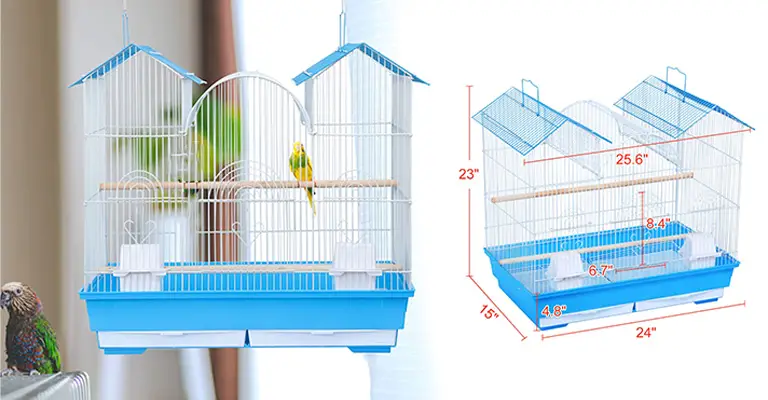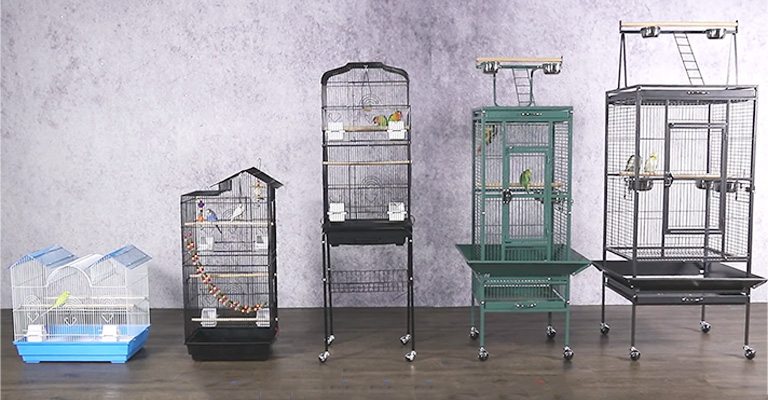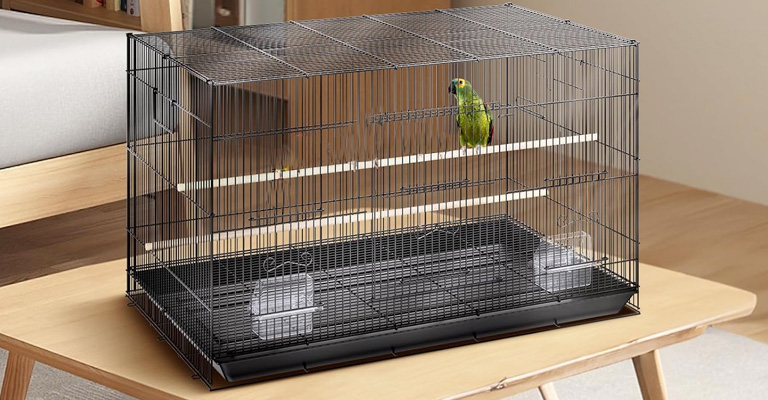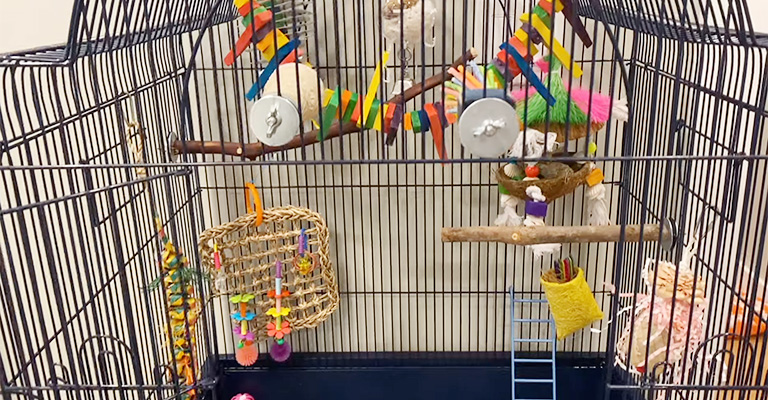When it comes to providing a safe and comfortable habitat for your beloved conure bird, choosing the right cage size is paramount. Conures are vibrant and intelligent avian companions that require ample space to thrive.
In this comprehensive guide, we will explore the essential factors and considerations to help you make an informed decision.
Conure birds, with their playful nature and spirited personalities, need room to spread their wings, exercise, and explore. The choice of cage size isn’t merely a matter of convenience; it directly impacts your bird’s physical and mental well-being.
Whether you’re a first-time conure owner or looking to upgrade your feathered friend’s living quarters, this blog post will provide you with invaluable insights and practical tips to ensure your conure’s happiness and health.

In What Type of Place Conure Birds Love to Live?
Conure birds thrive in environments that mimic their natural habitat, which primarily consists of the tropical and subtropical regions of South and Central America.
They are highly social and intelligent birds, so they prefer spacious living quarters with plenty of mental stimulation and social interaction.
Ideal places for conure birds include spacious cages or aviaries with room to spread their wings and fly short distances. They enjoy a variety of perches, toys, and climbing opportunities to keep their active minds engaged.
Conures are sensitive to temperature, so maintaining a comfortable and consistent climate is crucial.
In addition to a comfortable living space, conures need a balanced diet of fresh fruits, vegetables, and high-quality pellets. A peaceful and secure environment away from predators and drafts is essential.
Conure birds thrive when they have loving and attentive human companionship, making them great pets for those willing to invest time and care into their well-being.
Factors to Consider When Choosing a Cage Size

Selecting the appropriate cage size is a critical aspect of responsible pet ownership for birds. The size and type of cage you choose directly impact your pet bird’s health, well-being, and overall quality of life.
Here are several important factors to consider when choosing a cage size:
Bird Species
Different bird species have varying requirements when it comes to cage size. Smaller birds like finches or budgerigars can thrive in smaller cages, while larger species like macaws or African grey parrots need significantly larger enclosures due to their size and active nature.
Wingspan
Consider the wingspan of your bird. Your cage should allow your bird to fully extend its wings without touching the sides of the cage. This is essential for exercise and overall muscle health.
Activity Level
Take into account the activity level of your bird. More active birds, such as parakeets or conures, require larger cages with room for toys, perches, and opportunities to fly and explore.
Time Outside the Cage
Consider how much time your bird will spend outside of the cage. If your bird will have regular, supervised out-of-cage time, you may be able to opt for a slightly smaller cage than if your bird spends most of its time confined.
Number of Birds
If you plan to house multiple birds in the same cage, you’ll need a larger cage to ensure they have enough space to coexist comfortably without territorial disputes.
Perches and Toys
Ensure that the cage can accommodate various perches of different sizes and types, as well as toys and enrichment activities to keep your bird mentally and physically stimulated.
Hygiene and Maintenance
A larger cage is easier to clean and maintain, as it allows for better air circulation and minimizes the buildup of waste. Adequate space also reduces the risk of stress-related health issues.
Safety and Security
The cage should be escape-proof and secure to protect your bird from potential hazards or predators. Ensure that the bars are appropriately spaced to prevent your bird from getting stuck or injured.
Ventilation
Good airflow is essential for your bird’s respiratory health. Opt for a cage with proper ventilation to prevent the buildup of stale air and humidity.
Future Growth
Consider the potential growth of your bird. If you have a young bird that will grow significantly in size, it’s better to invest in a larger cage from the start rather than having to upgrade later.
Choosing the right cage size involves a thorough understanding of your specific bird’s needs, species, activity level, and living conditions. Providing a spacious and well-equipped cage ensures that your feathered friend enjoys a happy and healthy life in captivity.
Always consult with avian experts or veterinarians for species-specific guidance on cage size and setup.
Appropriate Size of Cage for Conure Birds

The appropriate cage size for conure birds can vary depending on the species of conure and the number of birds you plan to keep in the same enclosure. Here are some general guidelines for cage sizes based on the number of conure birds:
Single Conure
If you have a single conure, a cage with dimensions of around 24 inches (61 cm) in width, 24 inches (61 cm) in depth, and 24 inches (61 cm) in height is a minimum recommendation. However, larger is always better for your bird’s comfort and well-being.
Pair of Conures
For a pair of conures, consider a cage that measures at least 36 inches (91 cm) in width, 24 inches (61 cm) in depth, and 36 inches (91 cm) in height. This additional space allows for the social interactions between the two birds.
Multiple Conures
If you plan to keep more than two conures together, you should choose an even larger cage.
A cage with dimensions of 48 inches (122 cm) in width, 36 inches (91 cm) in depth, and 48 inches (122 cm) in height or larger is suitable for multiple conures. Ensure there is enough space for them to fly, move around, and perch comfortably.
Remember that these are minimum recommendations, and providing a larger cage is always beneficial for the health and happiness of your conure birds.
Additionally, the cage should have appropriately spaced bars to prevent escapes and injuries, as well as features like perches, toys, and feeding stations to keep your birds mentally and physically stimulated. Regular out-of-cage time for exercise and social interaction is also essential to maintain your conures’ overall well-being.
Cage Accessories and Enrichment for Conure Birds

Creating a stimulating and enriching environment within your conure’s cage is essential for their mental and physical well-being. Here are eight cage accessories and enrichment ideas, along with explanations for each:
Variety of Perches
Offer a variety of perches with different textures, thicknesses, and shapes. Natural wood perches, rope perches, and cement perches provide various textures that help maintain your conure’s foot health. Different perch sizes also prevent foot problems and keep their feet exercised and healthy.
Toys
Provide a selection of safe and engaging toys, such as chew toys, foraging toys, puzzle toys, and bells. Toys keep your conure mentally stimulated, help prevent boredom, and encourage physical activity. Rotate toys regularly to maintain their interest.
Swings
Conures often enjoy swings or hanging perches. Swings provide entertainment and exercise as your bird swings back and forth. Ensure the swing is of appropriate size and securely attached to the cage.
Shreddable Toys
Shreddable toys made of materials like paper, cardboard, or palm leaves allow your conure to engage in natural behaviors like tearing and shredding. These toys offer mental and physical stimulation and can help satisfy their instinctual desires.
Mirrors
Some conures enjoy mirrors, as they can interact with their reflection. However, not all birds react positively to mirrors, so observe your conure’s behavior to ensure it doesn’t become overly territorial or stressed.
Foraging Opportunities
Hide food treats within the cage to encourage foraging behavior. Foraging toys or puzzle feeders make mealtime more interesting and mimic the way conures find food in the wild, promoting mental engagement.
Bathing Dish
Conures typically enjoy bathing, so provide a shallow dish of water for them to splash around in. Regular baths help keep their feathers clean and healthy. Make sure the dish is securely attached to prevent spills.
Cage Covers
Consider using cage covers to create a sense of security and darkness for your conure during rest periods. This can help regulate their sleep patterns and reduce stress.
Remember to regularly clean and inspect cage accessories for wear and tear to ensure your conure’s safety. Additionally, provide plenty of fresh water, a well-balanced diet, and social interaction outside of the cage to maintain their overall health and happiness.
Tailoring the cage accessories to your conure’s individual preferences and needs is key to providing a fulfilling and enriching environment.
Mistakes to Avoid While Choosing a Cage for a Conure
Selecting the right cage for your conure is a crucial decision that can significantly impact your bird’s well-being and quality of life. To ensure you make an informed choice, here are six common mistakes to avoid when choosing a cage:
Choosing an Inadequate Size
One of the most common mistakes is selecting a cage that is too small. Conures are active and intelligent birds that require ample space to move, stretch their wings, and play.
A cramped cage can lead to stress, boredom, and even health problems. Always opt for a cage that meets or exceeds the recommended size for your specific conure species.
Overlooking Bar Spacing
Inappropriate bar spacing can pose a serious safety risk. Conures are known for their curiosity, and if the bars are spaced too widely, they may squeeze through or get stuck, resulting in injury or escape.
Conversely, bars that are too close together can inhibit their movement and enjoyment. Ensure the bar spacing is appropriate for your conure’s size and species.
Neglecting Durability
Choosing a flimsy or poorly constructed cage can lead to problems in the long run. Conures are active chewers and can be rough on their cages, so investing in a sturdy, durable cage made of safe materials is essential.
Look for non-toxic, bird-safe coatings and materials that can withstand your bird’s activity.
Ignoring Ease of Cleaning
Proper hygiene is crucial for your conure’s health. Neglecting to consider how easy it is to clean the cage can result in a dirty and unsanitary living environment.
Look for cages with removable trays and access points that make cleaning and maintenance hassle-free.
Lack of Proper Perches and Accessories
Conures need a variety of perches of different sizes and textures to exercise their feet and avoid foot problems.
Many cages come with basic perches, but it’s essential to customize the cage with additional perches, toys, and enrichment items to keep your conure mentally stimulated and physically active.
Placing the Cage in Isolation
Conures are social birds that thrive on interaction with their human caregivers. Placing the cage in an isolated area of your home can lead to loneliness and boredom.
Instead, position the cage in a central, well-lit, and socially active part of your home, where your conure can observe and interact with family members.
Selecting the right cage for your conure requires careful consideration of size, safety, durability, cleanliness, accessories, and the cage’s placement within your home.
By avoiding these common mistakes, you can provide your conure with a safe, comfortable, and stimulating living environment that promotes their physical and mental well-being.
FAQs
For a single conure, a cage that’s at least 24 inches in width, depth, and height is recommended. Larger cages are better. For multiple conures, consider a cage with dimensions of 48 inches or more in width, 36 inches in depth, and 48 inches in height.
While out-of-cage time is essential, the cage should still be spacious. Conures need room to move and exercise even when they’re not exploring outside. A larger cage provides a more comfortable and stimulating environment for your bird.
Bar spacing is crucial for safety. Ensure the bars are spaced appropriately for your conure’s size and species. Too wide spacing can lead to escapes or injuries, while bars that are too close together may restrict your bird’s movement and play.
For multiple conures, calculate the cage size by considering the total wingspan of all birds. A cage should be spacious enough to allow them to fly short distances, perch comfortably, and have room for toys and social interactions without crowding.
If your conure outgrows its cage, it’s best to invest in a larger one as soon as possible. A cramped living space can negatively affect your bird’s health and happiness. Always prioritize your conure’s comfort and well-being by providing an appropriately sized enclosure.
Wrapping Up
Selecting the right cage size for your conure bird is a decision that demands careful consideration. By taking into account the specific needs of your bird’s species, activity level, and future growth, you can create a living space that fosters their happiness and longevity.
Remember, a well-chosen cage isn’t just a place to keep your conure; it’s a sanctuary where they can thrive, play, and flourish.
Invest the time and effort in choosing the perfect perch, and your conure will reward you with years of companionship and joy in return. Hopefully, you have got my points. Thank you for your time.